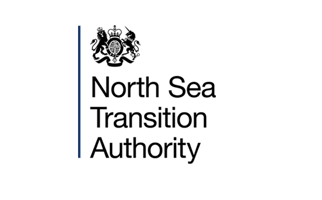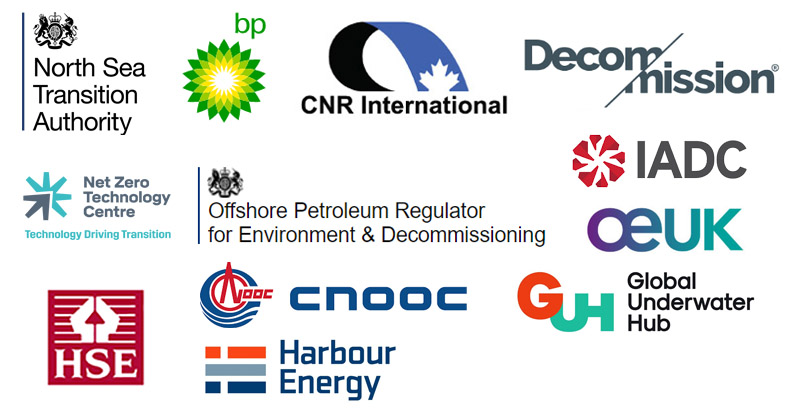
The Decommissioning and Repurposing Taskforce’s (DaRT) objective is to support industry to safely reduce the cost of decommissioning in an environmentally responsible manner by ensuring an integrated approach to address the key challenges and opportunities facing the sector, facilitating dialogue between all stakeholders, and working together to deliver strategic direction and tangible improvements.
Task force member organisations

Co-Chairs are currently Scott Barr (Harbour Energy) and Alastair Bisset (NSTA)
Focus areas
2024 The taskforce sets annual focus areas which look to align with some of the key topics or emerging challenges in the decommissioning sector, and works on these over the course of the year, whilst also looking to engage with other active groups and networks that are looking to support and serve decommissioning projects/activities. Given the range of organisations represented on the DaRT, some of the recurring agenda areas include:
- New Technology
- Regulatory Topics (NSTA, OPRED & HSE)
- Supply Chain updates
- Drilling & Wells
- Subsea
- Annual Decom Reports (Cost, Performance & Benchmarking)
- International Perspectives on Decommissioning
- Infrastructure Repurposing
Decommissioning Workgroups
The DaRT is just one of a number of workgroups that are currently active in the decommissioning sector of the UKCS. An overview of these groups - including details of their objectives, who facilitates them and who their members are - is included at the link below, to help provide visibility and awareness of these to decommissioning practitioners. The NSTA is involved with several of these groups, in varying capacities and roles.
Below is a link to an overview of these groups as they stand as of Q1 2024, for reference and further information
Reports & Publications
The Government has set a target to reach net zero emissions by 2050 and the OGA has set out expectations (SE11) for the upstream oil and gas industry to reduce, as far as reasonably possible, Greenhouse Gas Emissions, including in decommissioning.
North Sea industry made great strides cutting the overall cost estimate for decommissioning, by 25%, or £15 billion, between 2017 and end-2021.
The NSTA is now challenging the sector to build on strong progress by lowering the total estimate for decommissioning redundant platforms, wells and pipelines by an additional 10%, from £37 billion to £33.3 billion, between 2023 and end-2028.
Through the North Sea Transition Deal agreed in March 2021, industry set a voluntary target of achieving 50% UK local content across the lifecycle for all related new energy technology projects by 2030, as well as in oil and gas decommissioning. DaRT is supporting the Supply Chain and Exports Task Force on the delivery of this target work.
DaRT is working with the NSTA to promote and embed repurposing into late life decision making within the operating community.
DaRT is working with the Net Zero Technology Centre (NZTC) and the National Decommissioning centre to support the development and deployment of New Technology for Decommissioning.
The North Sea Transition Forum response to the 2019 Call for Evidence into decommissioning identified stakeholder interest in reviewing the impact of “liability in perpetuity” on the UK decommissioning market to assess whether it is a barrier to innovation, or otherwise restrains the market from developing efficient commercial decommissioning offerings.
While the Government has not requested further action on this topic, improving the understanding of which parties are subject to Post Decommissioning Liability remains a priority for industry and it is an area of focus for DaRT.
Terms of reference
Purpose
- To fill the gap, focussing on things that would otherwise not be delivered by industry.
- Provide leadership and support for the development and deployment of the Decommissioning Strategy.
- Cost Reduction: Support the delivery of reduced decommissioning costs (from 2017 base).
- Supply Chain development: Support growth of competitive decommissioning market and supply chain, to maximise UK benefits including export potential.
- Assist the government with meeting its net zero target through supporting integration of net zero in late-life, repurposing and decommissioning
- Policy & stakeholders management: Influence policies, legislation and related guidance, and increase stakeholder alignment.
- Skills Development: Work with OPITO to support development of decommissioning skills by providing opportunities for wider industry members to get involved with Task Force workstreams.
Membership
- The Decommissioning and Repurposing Taskforce will be co-chaired by industry and the NSTA.
- Members will include the representatives from operators, contractors, the NSTA, Offshore Energies UK, Decom North Sea, OPRED, HSE and NZTC.
- New additional members to the taskforce must be agreed by the majority of taskforce members.
- The industry (operators and contractor) representatives and the industry chair will hold their post for a maximum period of two years unless extended with agreement from taskforce members.
How we will work
- When participating in task group duties members will represent the UK oil and gas industry as a whole and not their individual companies.
- The Decommissioning and Repurposing Taskforce will create and disband subgroups where appropriate.
- Taskforce members will highlight any perceived or real conflicts of interest to the chair or secretariat.
Meetings
- The Decommissioning and Repurposing Taskforce meetings will be held at least once every two months.
- Attendance is strongly encouraged. Members may nominate a suitable replacement to attend a meeting only if they are unable to attend.
- The NSTA will provide secretariat support.
- Decommissioning and Repurposing Taskforce members should submit any pre-read materials 5 working days prior to meetings to enable the secretariat to issue these to the group a minimum of 3 workings days prior to the meetings.
If you wish to contact the Task Force please email us at correspondence@nstauthority.co.uk


